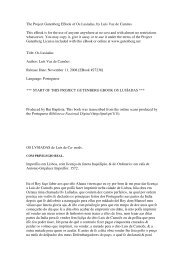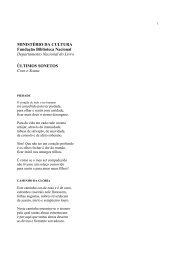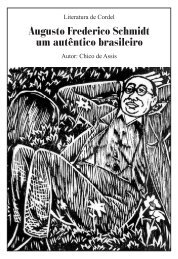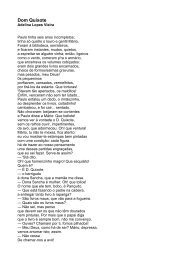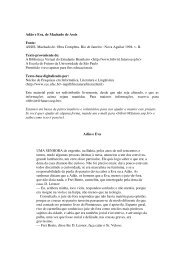Create successful ePaper yourself
Turn your PDF publications into a flip-book with our unique Google optimized e-Paper software.
Judith. There was a Judith, daughter of Beer the Hittite, one of the wives of Esau (Gen.<br />
xxxvi. 34). Hugo may or may not have had this personage in his mind.<br />
asphodèle. Hugo is not always accurate in his local colouring. Asphodels are not found<br />
in Palestine.<br />
Galga<strong>la</strong>, the form found in the Septuagint and Vulgate of the p<strong>la</strong>ce-name Gilgal.<br />
Les grelots <strong>des</strong> troupeaux. Here, again, Hugo is inaccurate. Sheep in Palestine do not<br />
have bells attached to them.<br />
Jérimadeth. The name seems to be of Hugo's own invention. It was a trick of the poet's<br />
to make proper names suit the exigencies of rime, as in this instance, in which<br />
'Jérimadeth rimes with' demandait.<br />
AU LION D'ANDROCLÈS.<br />
It is impossible to name the period to which Hugo is referring in this poem more<br />
precisely than by saying that it is the age of Rome under the Empire. As will be seen<br />
from the notes, the personages and events alluded to are not all contemporaneous. It was<br />
enough for Hugo that they were typical of the Roman decadence.<br />
Trimalcion. The festival of Trimalcion is an episode in the Satyricon of Petronius<br />
Arbiter, the poem in which are <strong>des</strong>cribed all the excesses of Roman luxury and<br />
debauchery. Petronius Arbiter lived in the time of C<strong>la</strong>udius.<br />
Lesbie. Hugo is guilty of one of his inaccuracies here. Lesbia was the <strong>la</strong>dy to whom the<br />
poems of Catullus (87-47 B.C.?) were addressed, while Delia, who is mentioned below<br />
in connexion with Catullus, was in reality the mistress of Tibullus (54 B.C.-19 A.D.).<br />
Crassus. Hugo no doubt refers to M. Licinius Crassus (died 53 B.C.), the Triumvir,<br />
who, when praetor, led an army against the revolted g<strong>la</strong>diators under Spartacus. He<br />
twice defeated them and subsequently crucified or hung, along the road from Capua to<br />
Rome, six thousand s<strong>la</strong>ves who had been taken prisoners.<br />
Épaphrodite. Epaphroditus, a freedman and favourite of the Emperor Nero, was the<br />
master of Epictetus, the <strong>la</strong>me s<strong>la</strong>ve and Stoic philosopher, who was amongst the greatest<br />
of pagan moralists. Epaphroditus, who treated his s<strong>la</strong>ve with great cruelty, is said to<br />
have been one day twisting his leg for amusement. Epictetus said, 'If you continue, you<br />
will break my leg.' Epaphroditus went on, the leg was broken, and Epictetus only said,<br />
'Did I not tell you that you would break it?'<br />
Hugo seems to have in mind the short reigns of Galba (r. A.D. 68-9), Otho (r. A.D. 69),<br />
and Vitellius (r. A.D. 69), all of whom perished by violence.<br />
Vitellius was famous even among the <strong>la</strong>ter Romans for his gluttony and voracious<br />
appetite. During the four months of his reign he is said to have spent seven millions<br />
sterling on the pleasures of his table. When at <strong>la</strong>st the people rose against him, and the




